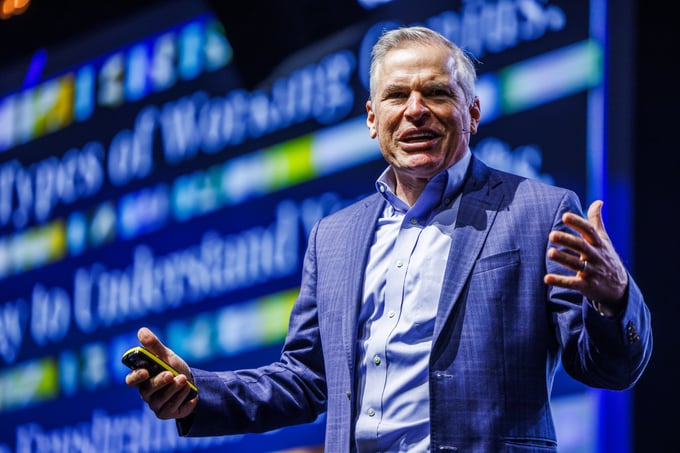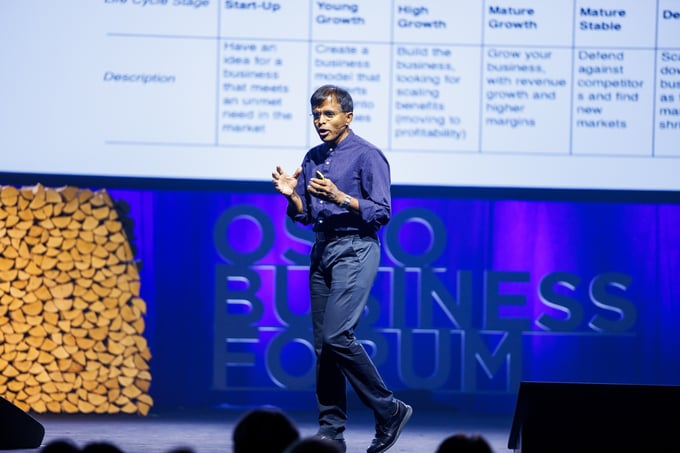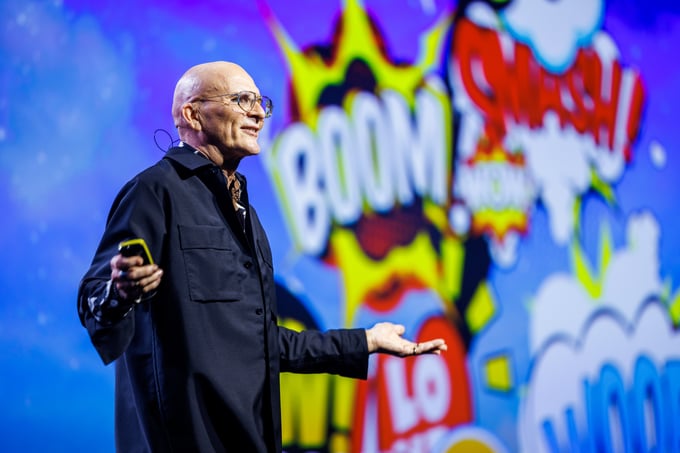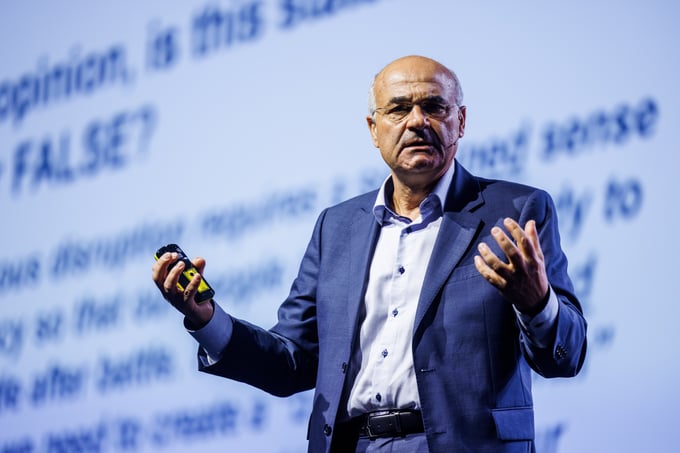As leaders, we've all experienced it: chaos in business. It's something we fear and try to avoid at all costs. But when you think about it, many top companies like Facebook, Microsoft and others became successful by making chaos part of their culture.
The environment we're working in today demands that we adopt new ways of thinking, behaving, and leading. It demands that we learn how to thrive in chaos.
Oslo Business Forum 2023 gathered 2,500 business leaders at Nova Spektrum and over 10,000 online attendees from more than 30 countries over two days. Eager to take their leadership to the next level, these executives embraced insights from some of the greatest minds in business today. The event illuminated challenges, shifted ways of thinking, and inspired change.
Here are 10 of the most impactful leadership learnings from this year's Forum to help you own the chaos and make it your company's superpower.
.jpg?width=680&height=454&name=IMG_6165%20(1).jpg)
Learning #1: Rely on grit in challenging times.
Maryna Saprykina is the CEO of CSR Ukraine and Founder of the Ukrainian Women Entrepreneurs Hub. She is also a beacon of hope and a testament to the indomitable spirit of Ukrainian businesses.
"Resilience is the characteristic we need now.".
– Maryna Saprykina
As tensions emerge between superpowers and disruption shakes the world in ways we can't predict, Maryna is adamant that resilience is the most important characteristic leaders need now. In her session at Oslo Business Forum, she unraveled the wartime sustainability strategies that have fueled Ukrainian business tenacity and powered remarkable transformation.
Maryna hitched together a five-wagon resilience train that includes speed, big objective, values, people, and customers. "These components together construct the track to resilience, innovation, and competitiveness," she said.

Learning #2: Uncover your strengths and weaknesses.
Patrick Lencioni, author and founder of The Table Group, revealed to leaders at Oslo Business Forum the single most important thing they can do in chaotic times: discover your working genius.
Pat's most recent book, The Six Types of Working Genius, is designed to help people find joy and energy in their work. He has come up with a revolutionary way to think about work and a new framework teams can use to tap into each individual's gifts.
Pat believes we each have unique geniuses. Wonder. Invention. Discernment. Galvanizing, Enablement. Tenacity. When we identify which we and our team members are gifted with, we can begin doing more of the things that bring us joy and energy and less of the things that don't.
"For almost no money, this will increase engagement, morale, motivation, and productivity," he said. "It will deliver the most transformation in the shortest period of time."

Learning #3: If you do nothing, nothing will happen.
Rebecca Henderson, Harvard Professor and Research Fellow at the National Bureau of Economic Research, warns that we are rocking the systems that support civilization by letting climate change continue.
Rebecca's session at Oslo Business Forum emphasized how sustainability and ethical decision-making are critical for the health of the bottom line and the health of our planet. Her book, Reimagining Capitalism in a World on Fire, is part of a broader conversation about the responsibility of business leaders in addressing the world's most pressing challenges.
"At this moment in human history, you have the opportunity to make a very significant difference," Rebecca said. "I believe the private sector, moving thoughtfully and together, can make an enormous difference in the problems that we face today. And I believe you can lead them."
.jpg?width=680&height=454&name=IMG_6927%20(1).jpg)
Learning #4: Surround yourself with good people.
Sir Richard Branson, founder of the Virgin Group, built a business empire by pursuing dreams that seemed impossible. He also made certain he surrounded himself with good people.
In a discussion at Oslo Business Forum that focused on big ideas for leaders, Sir Richard credited the enthusiasm that fuels him to "good people around you, loving life, learning." He also leaned into the sense of self-awareness that is crucial for every leader. His advice is to find someone better than you to run your business on a day-to-day basis. And rather than thinking of it as effectively putting yourself out of business, turn your attention to the important things you'll now have more time for.
"You’ve got to not think, I’m the only person in the world who can do what I’m doing." – Sir Richard Branson
"Spend time thinking about the big picture and jump in when the really big decisions need to be made," he said. "Everything about your life will be better if you can do that."

Learning #5: Think about the fourth horizon.
Amy Webb, founder and CEO of the Future Today Institute. At Oslo Business Forum, Amy demonstrated what's wrong with the way business leaders are thinking about AI today.
Amy showed leaders how to shift their thinking and build a better future by leveraging the Four Horizons Framework. In her opinion, too many leaders today are making decisions driven by fear. They are spending wasted time in Horizons 1 and 2, Operations and Strategy when they should be spending their time in Horizons 3 and 4, Vision and Transformation.
"Think about the fourth horizon. What does this mean for the future?" Amy said. "Based on this long-term vision and plan, what does that mean for our strategy and our current operations?"
If leaders can think long-term, their fear will disappear, and they will feel like they have the time to make better decisions. "Regardless of what you hear, the future of AI is not determined," she said. "It's up to you and the choices that you make about the future today."

Learning #6: Mediocrity is dead.
Anssi Rantanen is a serial entrepreneur and growth expert who helps business leaders understand how to harness the power of AI to enhance efficiency and unlock growth.
The rapid expansion of generative AI has many business leaders questioning what it means for them and their teams. In a session at Oslo Business Forum, Anssi revealed the immense potential of AI and its drawbacks. Currently, there are more than 1,000 AI startups emerging every month. Anssi believes this has interesting implications for businesses, and he said the most important is this: "Mediocrity is dead."
Using the tools available today, anyone can create a mediocre website, sales presentation, or business plan in seconds or minutes. "Generative AI is good at creating 60% versions of anything in seconds or minutes," Anssi said. "But you can't forget the last 40%. The human touch."

Learning #7: Make sure your business acts its age.
Aswath Damodaran, known as the finance world's "Dean of Valuation," believes that companies go through a life cycle just like humans do. In a session at Oslo Business Forum, Aswath helped leaders understand how to navigate the sometimes chaotic transitions their businesses face as they move from stage to stage.
Every company will experience transitions in its life cycle, and oftentimes, those transitions can be challenging. Aswath pointed out, "The nature of the chaos you face will be different depending on where you are in the life cycle." These periods of chaos and change will test the strength of a business and its leaders and can determine its eventual fate.
Aswath offered leaders plenty of knowledgeable insight to help them navigate the challenges their business will face at various stages. Most importantly, he gave them a piece of practical advice: "Act your age. Stop trying to be something you're not."

Learning #8: Now is the time to create the stories.
Kjell A. Nordström, economist, management thinker, and author, is a clear voice for leaders seeking direction. In a session at Oslo Business Forum, Kjell combined his knowledge with practical advice, outlining the way forward in a chaotic global economy.
Our globalized economy has been radically disrupted by change and uncertainty. Kjell's work to understand "what's next?" has led him to seek answers from some of the world's most progressive companies. He revealed the trends these companies are paying attention to today—which are the trends we must pay attention to tomorrow. The future points in one direction: we are transforming knowledge and intelligence into a service and leveling the playing field.
These changes require a new type of leadership, one that cuts through the chaos and complexity for those we lead. To create clarity, we must construct a story around our time. Kjell told leaders, "Now is the time to create the stories."

Learning #9: Reverse your approach to empower innovation
Costas Markides, management educator and professor of strategic leadership at London Business School. He believes leaders can learn not just to adapt in disruption but to thrive. The trick is to show your team you care.
"In difficult times, how you [lead] is important, and so is who you are," - Costas Markides
Costas believes agility is one of the most important traits of a good leader, and in today's context of continuous disruption, it is more important than ever. Embedding agility in the DNA of your organization requires you to give people autonomy without giving up control.
In business, you must set parameters for decision-making. If a decision falls within the parameters you set, your team has the authority to act. If it does not, they must come to you. "The biggest parameter in business is the strategy you have set," said Costas. "Make sure your people know your strategy and the choices you have made."

Learning #10: Anybody can be an activist.
Malala Yousafzai, education activist and the 2014 Nobel Peace Prize laureate, teaches others how to fight injustice in the world and everyday life, starting in their communities.
As a young girl, Malala recognized the issues in her community and country and felt compelled to act. "I did not consider it a job or profession," she said. "I thought everyone was an activist." In a riveting discussion at Oslo Business Forum, Malala shared a four-step framework that leaders can use to create change: research the issue, build a strategy, take action, and make an impact right where you are.
"Keep your dreams big." – Malala Yousafzai
She encouraged leaders not to be deterred by the challenges that accompany activism, and she advised them to start small. "Figure out the best way to give back to the people who are doing the work on the ground," Malala encouraged. "You know best how to use your resources and skills to support your community."
Want to be a part of the OBF community? Join Oslo Business Forum 2024: Courageous Leadership now! 